Dune: Prophecy: Premiere Date, Trailer, Cast & More
We break down everything we know about the sci-fi prequel series, from the creators and the stars to the setting and story, plus more.
Dune is far more expansive than one might think. The original novel series by Frank Herbert spanned six novels and several thousand years of galactic history. But even in the first Dune novel, there was the suggestion that history reached back eons from the days of Earth to the Imperium depicted in the book. In fact, Herbert’s in-universe essay about the development of the religious orthodoxy feels several centuries long to read.
Eventually, Herbert’s son, Brian, and science fiction veteran Kevin J. Anderson began to delve into some of that history via a new novel series, but HBO’s upcoming Dune: Prophecy promises to bring that deep lore to the masses who constantly hunger for more Dune to consume like so much Spice. But what does it mean to set a series millennia before Paul Atreides (Timothée Chalamet) was born? And will any of it matter to the characters and time period of the films and the eventual third entry?
Let’s take a look at everything we know about Dune: Prophecy to see if we can divine any prescient visions about the Imperium and its future.
A Beginning Is A Delicate Time
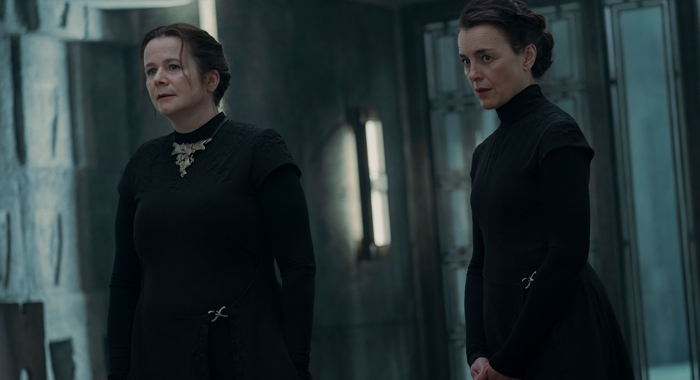
(Photo by Attila Szvacsek/HBO)
Set 10,000 years before the events of Denis Villeneuve’s two-part Dune adaptation, Prophecy centers on two sisters from House Harkonnen — the antagonist feudal family led by Stellan Skarsgård in the films — as they, according to the official synopsis, “combat forces that threaten the future of humankind.” The result of this fight will give us the Bene Gesserit sisterhood featured in the movies, which numbers Reverend Mother Helen Gaius Mohiam (Charlotte Rampling), Lady Jessica (Rebecca Ferguson), Lady Margot Fenring (Léa Seydoux), and Princess Irulan (Florence Pugh) among its members.
The series takes inspiration from Brian Herbert and Kevin J. Anderson’s Sisterhood of Dune. The 2012 novel was the first in a trilogy detailing the early days of the Imperium’s leading schools: the Bene Gesserit, the Mentats (represented in the films by Stephen McKinley Henderson’s Thufir Hawat and David Dastmalchian’s Piter De Vries), and the Suk school, evidenced in the first film via Dr. Wellington Yueh (Chang Chen).
Of course, ten millennia is a very long time, so it will be interesting to see how different each of the great schools might be in the series from their film counterparts. Indeed, setting the series 10,000 years before Dune offers the program the chance to look a little different. Although, as long time Dune fans known, the stagnation of the human race is a plot point in the greater scope of the story cycle, so an Imperium that already resembles the one in the films has an appeal as well.
But what is the Imperium like at this point in its history?
The State Of The Universe
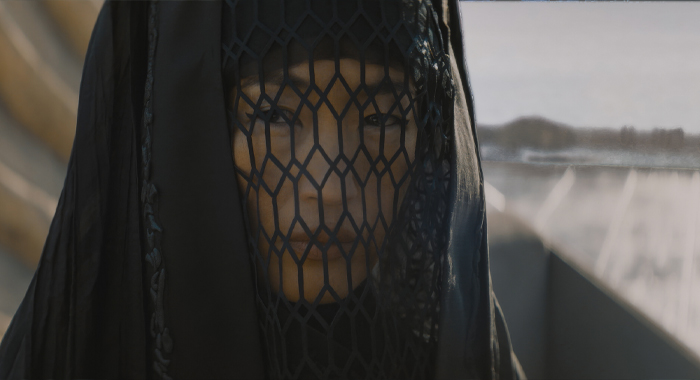
(Photo by HBO)
If Sisterhood of Dune is anything to go by, the Butlerian Jihad is still fresh in people’s mind. That conflict saw mankind overthrowing an oppressive artificial intelligence. The great schools began, in part, to teach the surviving humans how to handle the rigors of the universe without computer assistance. Each school chose a different emphasis, with the Bene Gesserit becoming a school for women and a place to learn the Voice, as seen in the series trailer and as those who attended New York Comic Con experienced first-hand at a fan event that was as atmospheric and unsettling as one would expect for Dune. Despite these schools and their disciplines, there is a wide array of opinions in the use of technology for other matters.
Meanwhile, the family who led the rebellion are now known as House Corrino, and they control the Imperial seat on planet Salusa Secundus – the planet Piter visited in the first film to pick up the Sardaukar warriors promised by the Emperor to Baron Harkonnen (Skarsgård). The family’s control of the Imperium is under attack, though, from an anti-tech faction. They, in turn, are opposed by those in control of space travel, which is vital to maintaining the empire.
Elsewhere, ancestors of the Atreides and Harkonnen characters we know from the films vie for gains of their own within the emerging political structure, even as the sisters begin to develop their emerging mental powers and plot the great work to produce the Kwisatz Haderach.
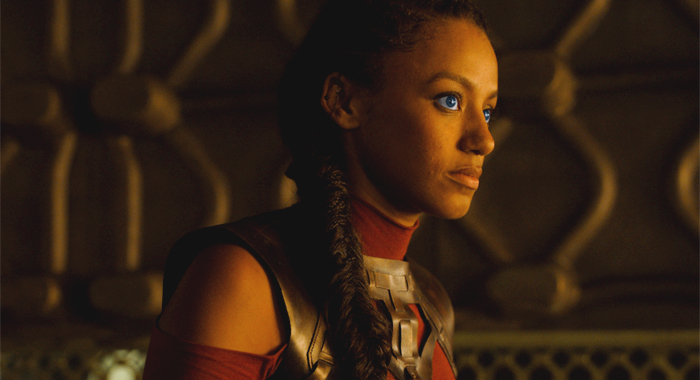
(Photo by Attila Szvacsek/HBO)
And if that weren’t enough, the “Free Men of Dune” on Arrakis are rejecting modernity for a more natural life in the deep desert.
No matter how much it takes from the novel, though, the political setting of Dune: Prophecy is almost more important than the geographical details of planets like Salusa Secundus or the worlds the various great houses call home at the time. Of course, it remains to be seen how closely the series will follow Sisterhood of Dune’s landscape. For one thing, the AI element — always in the background of Dune from the first novel’s publication — has not been included in any of its various media adaptations (beyond a brief mention in the infamous TV cut of David Lynch’s Dune) and only became a key part of the series when the younger Herbert and Anderson began writing their Dune novels in the late 1990s and early 2000s.
Indeed, if any memories of the Butlerian Jihad remain for the characters, the trailer HBO released during NYCC offers no indication of it.
The preview also suggests an Imperium already close to its depiction in the films, with the great houses already formed in the Landsraad, an emperor already fighting rivals with subterfuge, and Spice already the most valuable commodity in the universe.
The Sisterhood (And Others)
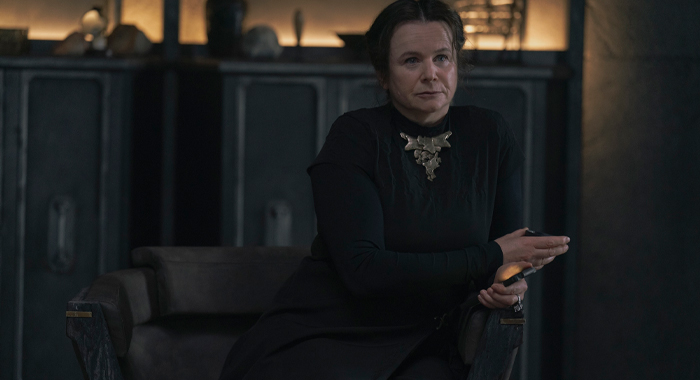
(Photo by Attila Szvacsek/HBO)
Emily Watson and Olivia Williams star as Valya and Tula Harkonnen, respectively. Valya serves as the head of the Bene Gesserit sisterhood while Tula is a Reverend Mother. Despite their family name, they appear to be the protagonists of the series and, certainly, the ambition of the school goes far beyond the names of the great houses and into their bloodlines.
Other members of the sisterhood include Faoileann Cunningham as Sister Jen, described in an early casting description as an “unpredictable acolyte”; Aoife Hinds as Sister Emeline, who embraces the Bene Gesserit with a religious zeal; Chloe Lea as Lila, a young sister in training with surprising empathy; and Jade Anouka as Sister Theodosia, a member of the order with a “dangerous secret about her past.”
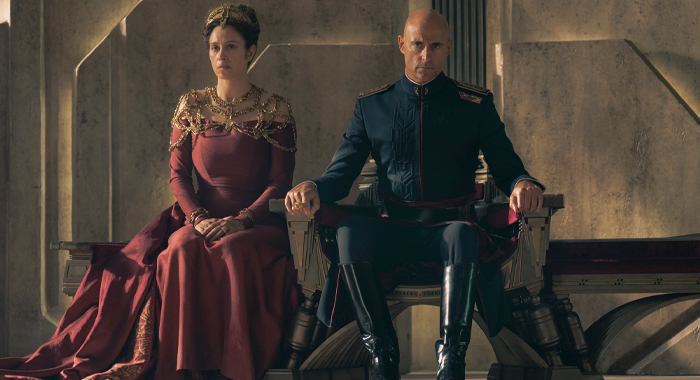
(Photo by Attila Szvacsek/HBO)
Also appearing on a recurring basis are Tabu and Charithra Chandran as Sister Francesca at two different times in her life. The elder version of the character returns to the palace after having been the emperor’s lover sometime in the past. Now a formidable Bene Gesserit sister, she threatens to change the dynamics in court. Additionally, Jihae embodies Reverend Mother Kasha Jinjo, the Imperial truthsayer whose loyalty to the sisterhood is questioned along the way.
On the Golden Lion Throne itself is Mark Strong as Emperor Javicco Corrino. He lives in the shadow of “war-time emperors,” but attempts to maintain the tenuous peace his marriage to Empress Natalya (Jodhi May) wrought across the human expanse of the universe. She is also no pushover, either. Sarah-Sofie Boussnina plays Princess Ynez, the heir apparent to Javicco. And serving the family is Mikaela (Shalom Brune-Franklin), a Fremen who has no memory of Arrakis, but hopes to make her way there someday.
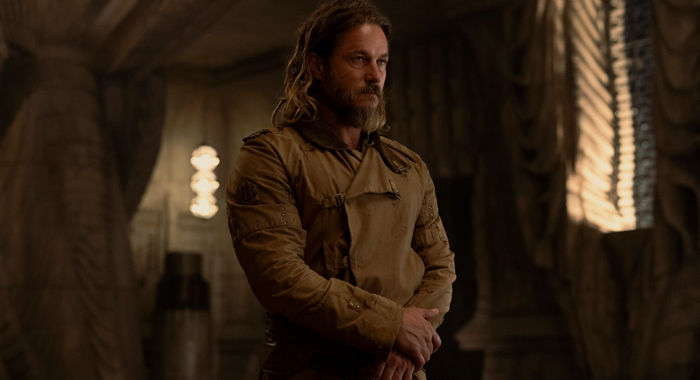
(Photo by Attila Szvacsek/HBO)
As seen in the trailer, Travis Fimmel’s Desmond Hart hopes to influence the Emperor against the Bene Gesserit. Indeed, he even tells Valya he aims to eradicate the sisterhood from the cosmos. But what is truly motivating his campaign against them?
Meanwhile, Swordmaster Keiran Atreides (Chris Mason) serves one of the other great houses, but his dedication to his role and elevating the family gets derailed when he makes an unexpected connection with someone in House Corrino.
Josh Heuston is set to recur as Javicco’s illegitimate son, Constantine, while Edward Davis assumes the role of Harrow Harkonnen, who seeks to restore his house to a position of power it formerly enjoyed. Other actors set to appear in the series include Camilla Beeput, Jessica Barden, Emma Canning, and Yerin Ha.
Architects Of The Prophecy
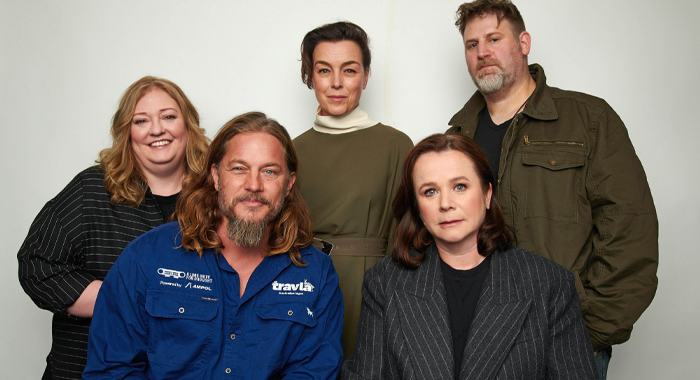
(Photo by Matt Doyle Photo/Getty Images)
Dune: Prophecy has been in development since the first Villeneuve film was released, and it has gone through several development teams and concepts. Alison Schapker ultimately became the program’s showrunner and executive producer with Diane Ademu-John, who co-developed the series, as another executive producer.
Anna Foerster, another member of the executive producer team, directed several episodes, including the premiere. Other EPs include Jordan Goldberg, Mark Tobey, John Cameron, Matthew King, Scott Z. Burns, and Jon Spaihts, who spearheaded the initial version of the program before handing development off to write Dune: Part Two. Brian Herbert, Byron Merritt, and Kim Herbert also serve as executive producers on behalf of the Frank Herbert estate. The younger Herbert’s frequent co-writer, Kevin J. Anderson, is credited as a co-producer.
The series writing team consists of Ademu-John, Kor Adana, Jordan Goldberg, Kevin Lau, Monica Owusu-Breen, Elizabeth Padden, Carlito Rodriguez, Leah Benavides Rodriguez, and Suzanne Wrubel.
Other crew include production designer Tom Meyer, cinematographers Pierre Gill, Richard Donnelly, Nikolaus Summerer; editors Ameila Allwarden, Sarah C. Reeves, and Mark Hartzell; and composer Volker Bertelmann. Production took place across 2022 and 2023.
The Time Is Right
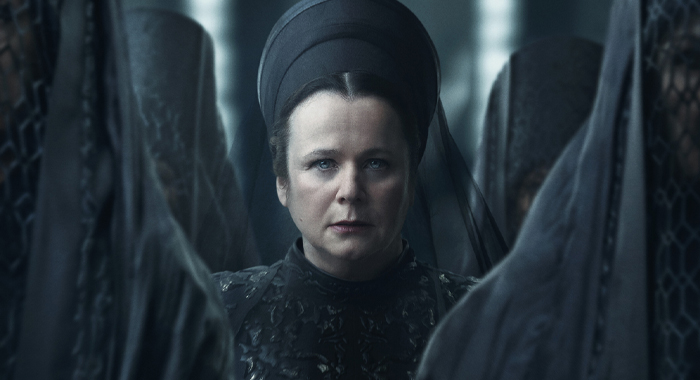
(Photo by HBO)
Dune: Prophecy begins on November 17, 2024, and with 10,000 years of ground to cover, it is unclear if the program will continue or molt into a different Dune series in the years to come. A miniseries about the Butlerian Jihad itself could be quite interesting. Additionally, these characters have the potential to guide viewers into other aspects of the Dune universe, like the Spacing Guild and the Face Dancers, a faction that will become important in the third film.
Beyond that, though, does the series have a grander connection to the films? That all depends on the nature of the titular prophecy. Is it just about the Kwisatz Haderach and the long-term plan to breed him from among the great houses — a plot that leads to Paul Atreides — or is it something else? That other aspect of the prophecy could indicate a very long on-screen life for Dune.






